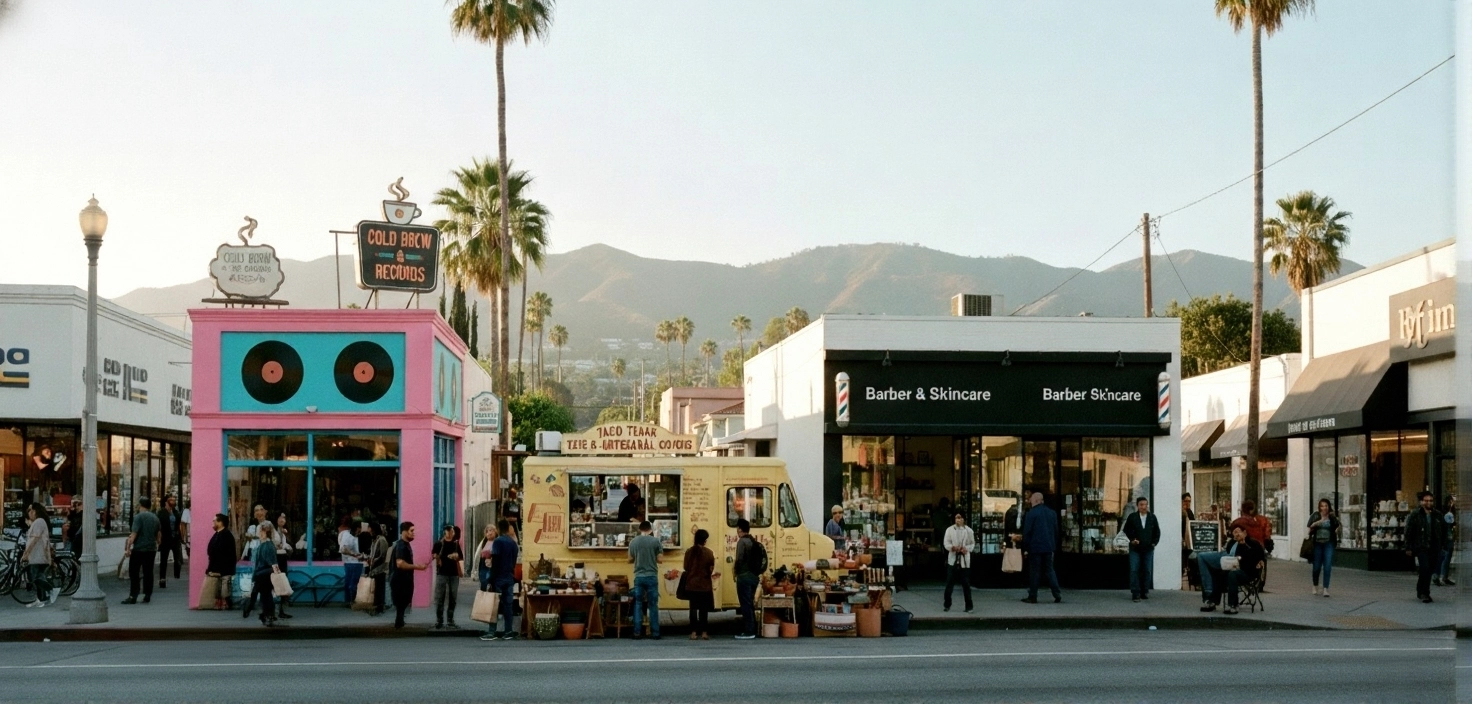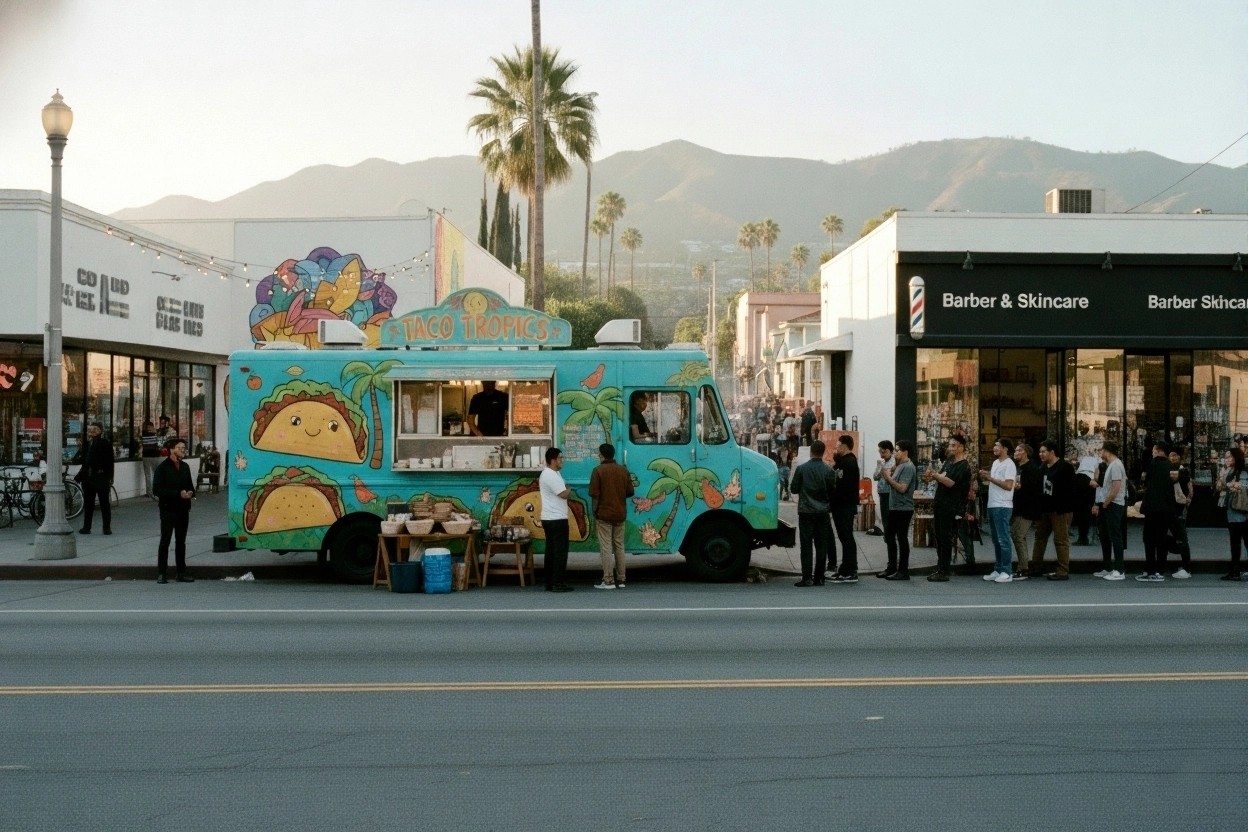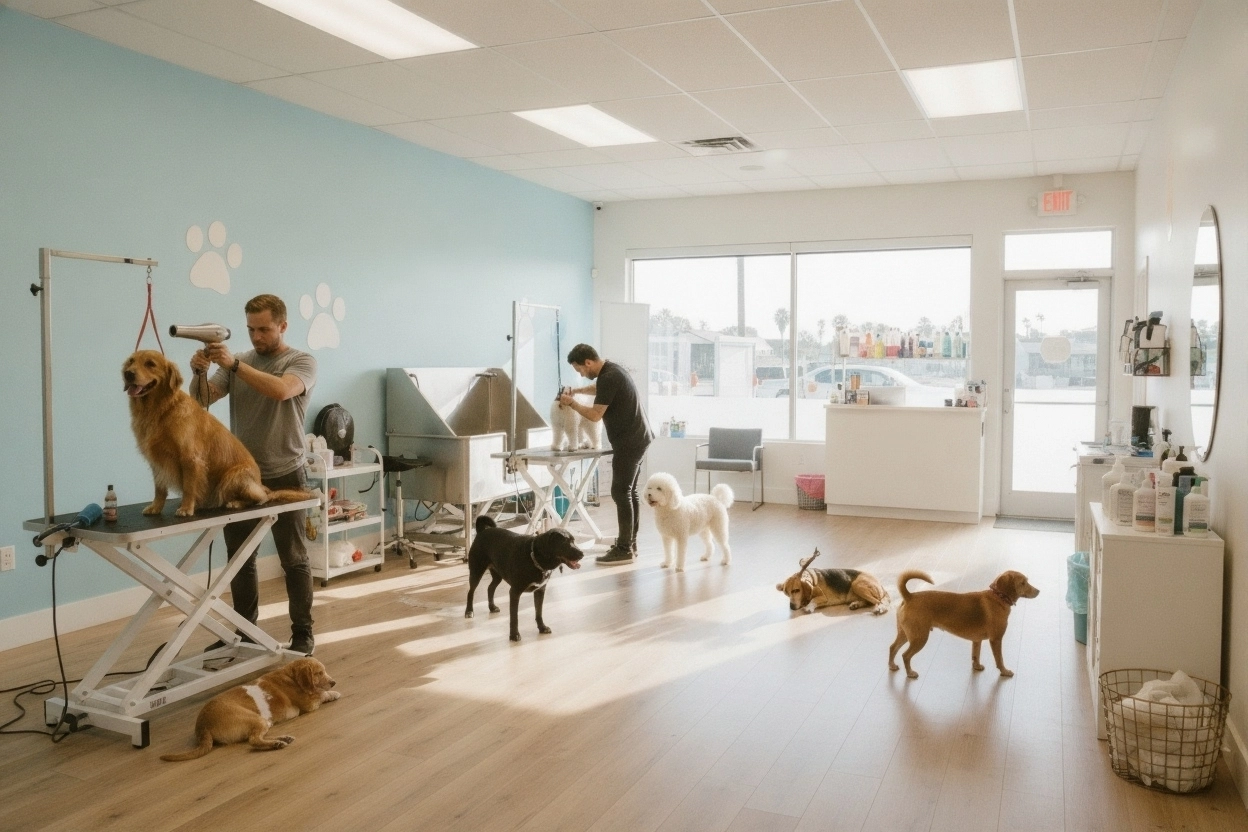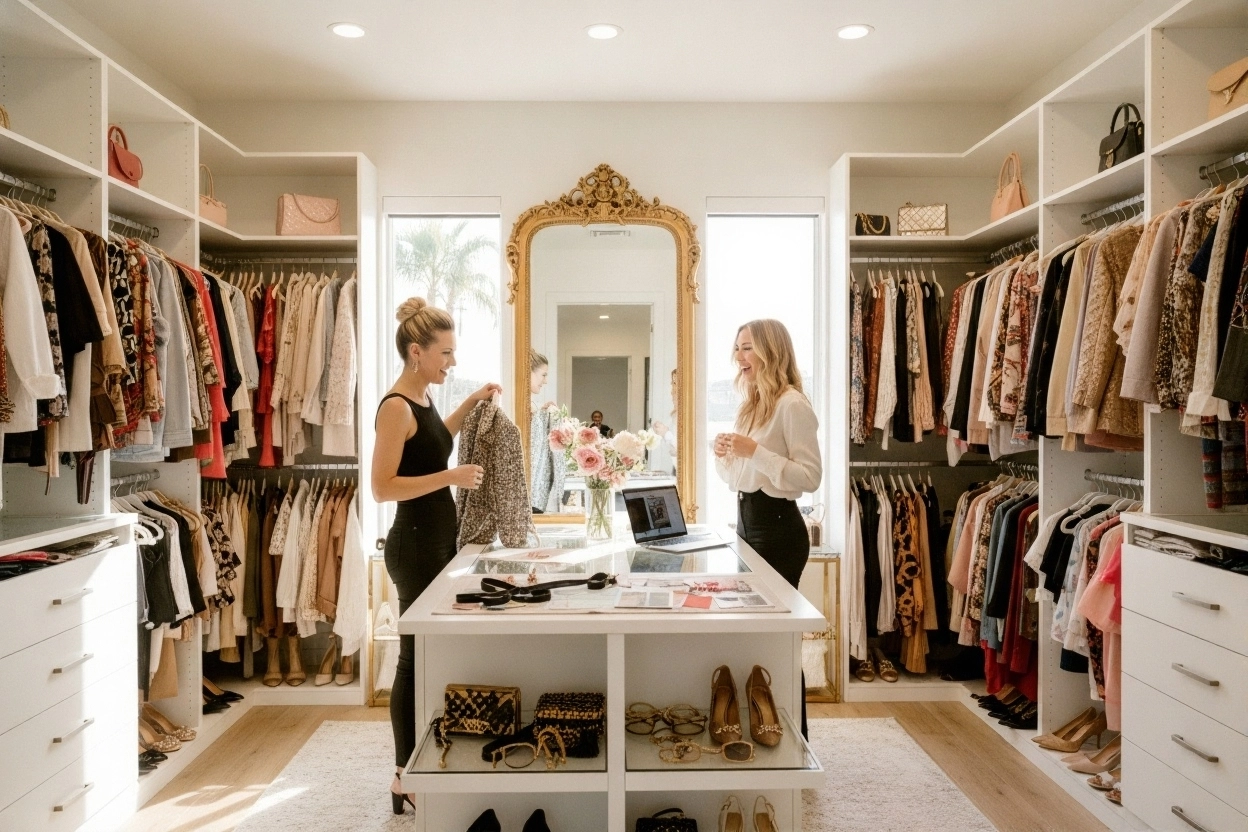12 Promising Small Business Ideas to Start in Los Angeles in 2025

Los Angeles has always been a place where ideas become identities. It’s a city where creative people gather not just to work, but to experiment, to express, and to build worlds that feel personal. If you’re exploring small business ideas to start in Los Angeles, you’re entering a marketplace that values originality, community, and experiences that make life feel just a little more cinematic.
Before choosing a business, it’s important to understand why LA is such a powerful launchpad.
Why Start a Business in Los Angeles?
Let's start with the sheer scale. Los Angeles isn't just a city; it's an economic titan. If LA County were its own independent country, its economy would rank as the 20th largest in the entire world as of 2024/2025, putting it ahead of countries like Switzerland and Poland.
What fuels that engine? Small business.
LA is home to over 1.3 million small businesses. More importantly, it's the most diverse entrepreneurial landscape in the nation, boasting the highest proportion of women- and BIPOC-owned businesses of any county in the U.S.
This is why the city is shaped by intersections — of cultures, aesthetics, industries, and lifestyles. Your business doesn’t have to appeal to everyone. It only needs to resonate deeply with one community, one neighborhood, or one shared way of seeing the world. LA rewards niche conviction, not mass appeal.
So, where should your business fit in this over $1 trillion economy? We’ve analysed 12 powerful small business ideas to start in LA.
1. Neighborhood Specialty Café or Drink Bar
In Los Angeles, cafés are far more than just places to buy coffee. They are community hubs, creative studios, remote workspaces, and emotional landmarks. A café here succeeds not just because the espresso is great (though it should be), but because it has a point of view.
The market data is remarkable. The total U.S. coffee market is valued at over $48 billion in 2025. The most powerful part of that market? Specialty coffee. It captures over 55% of the total value, and its growth is what's driving the entire industry.
This means success isn't about competing with everyone; it's about being a destination for someone. Maybe your concept leans into Japanese kissaten minimalism. Maybe it’s a plant-filled courtyard café with sunlit tables and handwritten menus. Or perhaps it’s a concept bar that revolves around a single ingredient—matcha, hojicha, cacao, or Yemeni coffee traditions.
The goal is to create a space that people want to step into, linger in, photograph, recommend, and return to. Think story-first, aesthetics-second, menu-third—all infused with sincerity. LA audiences reward authenticity and style in equal measure.
2. Boutique Fitness or Wellness Studio
Fitness in LA isn’t just physical — it’s emotional and communal. People join studios for belonging, identity, aspiration, routine, and connection. This is why boutique studios — pilates lofts, dance-cardio spaces, breathwork dens, boxing gyms, sound bath studios — continue to thrive. Moreover, the market growth is in your favour. The global fitness boutique market is expected to double to $80.4 by 2034 growing at a CAGR of 7.2%.
If you are able to design an experience rather than just a workout, your studio can build a fiercely loyal membership base. Names, rituals, playlists, textures, tone of voice — every detail influences how your studio is perceived.
What matters most is curation. Your space should feel intentional. Your instructors should feel human and present. Your members should feel like they are part of something that reflects the best version of themselves.
3. Food Truck or Mobile Kitchen

LA is arguably the capital of modern street food. It's the city that launched the gourmet food truck movement, and it remains the undisputed king.
This isn't just a niche, it's a massive, mobile industry. Los Angeles is home to over 4,000 food trucks, and the market is expected to grow at a compound annual growth rate (CAGR) of 6.08% for the U.S. West region.
While far cheaper than a full restaurant, a food truck in California is a serious investment. A used, permitted truck can cost between $50,000 and $100,000, while a brand-new, fully customized build-out can exceed $250,000.
Success comes from flavor clarity. You don’t need 30 items. You need four unforgettable ones. And a brand personality people remember — bold lettering, a catchy name, memorable colors, an origin story, or even a playlist that sets your vibe the moment someone walks up.
Your truck is your storefront, billboard, and stage—so treat it as a performance, not just a kitchen on wheels.
4. Pop-Up Retail Brand
Before committing to a storefront, many LA entrepreneurs launch through pop-ups — and for good reason. This "flexible retail" model lets you test your brand, refine your product, and build a following, all without the weight of long-term leases.
This isn't just a small-time tactic; it's a massive global industry projected to surge past $95 billion in 2025. It's the perfect low-risk, high-reward strategy for LA. While a permanent retail lease can be crippling, a staggering 44% of pop-up shops cost less than $5,000 to launch. This model is exactly what LA shoppers crave; data shows 55% of consumers visit pop-ups specifically to find unique products and experiences they can't get anywhere else.
Markets like Melrose Trading Post, Smorgasburg, Artists & Fleas, and seasonal night bazaars can expose you to thousands of people in a single day. Your booth becomes your full expression: signage, scents, textures, packaging, displays — all curated to spark curiosity.
This works beautifully for apparel, jewelry, skincare, ceramics, accessories, and home objects. Pop-ups allow your brand to grow in public, naturally and story-first.
5. Social-First Content Studio
Los Angeles is home to Hollywood, the original content capital of the world. Today, that legacy has evolved. LA is now the undisputed global epicenter of the new content capital: the Creator Economy.
This isn't a small niche; it's a massive industry. The global creator economy is valued at over $250 billion in 2025 and is projected by firms like Goldman Sachs to nearly double in size to $480 billion by 2027. Your customer base isn't just a few influencers; it's a significant portion of the 162 million people in the U.S. who identify as content creators, plus the 1.3 million small businesses in LA County, all of whom need professional content to compete on Instagram, TikTok, and LinkedIn.
A cozy, aesthetically designed photo/video studio can thrive if it’s created with these creators in mind: natural light, versatile backgrounds, thoughtful furniture, rentable props, and simple, hourly pricing.
Studios succeed when they feel inspiring, not clinical. Think warm textures, greenery, color palettes, floor-to-ceiling windows, mirrors, and spaces that tell stories without needing elaborate sets.
You’re not renting space. You're renting creative momentum.
6. Pet-Centric Services and Experiences

According to the Los Angeles Almanac, LA County is home to an estimated 5.3 million privately-owned dogs and 5.7 million privately-owned cats. This massive, high-spending audience creates huge opportunities for grooming studios, pet cafés, dog-friendly boutique retail, pet birthday experiences, and canine fitness programs. LA’s pet culture is deeply emotional. People treat their dogs like companions, not accessories.
What matters here is care. Tone, gentleness, attention, patience — customers trust with their hearts, not their wallets. If your brand feels loving and warm, word-of-mouth spreads naturally.
Small touches — like sending update photos, remembering pet preferences, or offering seasonal treats — build lifelong loyalty.
7. Curated Vintage or Reworked Fashion Shop
With over 1,840 used merchandise stores, California has the highest number of these establishments in the entire country, confirming that LA is the ideal place to build a brand on curation.
Fashion in LA is expressive and personal—and vintage plays a major role. This isn't just a trend; it's a core part of the local economy. Los Angeles is a global fashion hub, home to major apparel manufacturing, design schools, and iconic brands.
This intense focus on apparel shows up in the data: in 2025, consumer prices for apparel in the Los Angeles area rose 2.6% year-over-year, while the national average for the same period was just 0.1%. This data strongly suggests that local demand and consumer spending on clothing in LA are significantly outpacing the rest of the country.
A well-curated vintage store doesn’t just sell clothes; it sells identity, mood, and memory. Your success will come from curation: selecting pieces that feel timeless, cinematic, or intentional. You don’t need thousands of pieces, you need pieces that feel chosen.
Pair your selections with styling tips, stories behind the garments, and editorial-style photography. Your shop should feel like a world, not just a rack.
8. Cultural or Heritage-Based Bakery
Food tied to memory carries emotional weight. And LA’s multicultural roots make it a place where cultural baking thrives. This isn't just a feeling; it's LA's demographic reality. Nearly 40% of all residents in Los Angeles County are foreign-born, creating a massive, built-in audience for the authentic tastes of home.
Persian bakeries, Filipino ensaymada kitchens, Jordanian coffee-and-pastry houses, and Mexican pan dulce pop-ups succeed because they feel meaningful. They are tapping into a key driver of the global artisan bakery market: a powerful consumer "demand for authentic, handcrafted products tied to cultural heritage."
Recipes passed through generations tell stories without saying a word. The key is sincerity: ingredients matter, pacing matters, hospitality matters.
People aren’t just tasting — they’re remembering.
9. Micro-Event, Dinner Party, or Experience Design
From backyard dinner parties to rooftop gatherings to gallery pop-ups—LA loves intimate experiences that feel personal and artful. This isn't just a local vibe; it's a documented spending habit.
Angelenos spend 47.9% of their total food budget on "food away from home" (which includes restaurants and dining out). This is significantly higher than the national average of 39.2%, proving that LA residents prioritize going out and paying for experiences.
You are perfectly positioned to capture this high-demand market. You can design tablescapes, curate playlists, plan menus, and create micro-worlds inside ordinary spaces.
This is a business built on aesthetic sensitivity. You’re composing emotions—light, sound, food, scent, pace. If you can create an ambiance that makes people slow down, you’ll have clients for life.
10. Home Organization & Spatial Styling Service
With hectic schedules and creative workloads, many Angelenos want living spaces that feel calm, intentional, and aesthetic.
This desire is amplified by the city's market realities. With the cost of housing in Los Angeles 132.9% higher than the national average, every square foot is at an absolute premium. This makes organization more than a luxury; it's a necessity for maximizing a valuable investment.
Home organization in LA is part interior design, part minimalism, part emotional reset. You’re helping people reclaim physical and mental clarity. If you understand flow, storage rhythm, and visual harmony, this service builds deep client trust quickly.
11. Personal Styling & Wardrobe Identity Coaching

Identity is performance in LA — but a performance of authenticity, not artifice. This is a high-trust, high-value service.
This isn't just a side hustle; it's a lucrative career. While salaries vary based on experience, top personal stylists in Los Angeles can earn over $65,000 a year, with the wide pay range in the city suggesting many opportunities for skilled stylists to build a high-earning business.
Personal stylists help clients express who they are, not who they're pretending to be. You might help professionals refine their image, influencers develop signature looks, or everyday people reconnect with confidence. The work is emotional, creative, and highly relational.
12. Healthy Meal Prep or Delivery Kitchen
Health-conscious eating is part of the LA lifestyle. This is a market driven by a powerful demand for convenience.
Angelenos are spending more on prepared food. In the Los Angeles area, consumer prices for "food away from home" (like delivery and restaurant meals) rose 4.8% over the last year. This outpaced the increase for "food at home" (groceries), proving that LA residents are willing to pay a premium to save time.
A meal prep service built around quality, freshness, and balance—whether vegan, protein-focused, or heritage-inspired—can quickly develop weekly subscribers.
Packaging, clarity, flavor, and delivery reliability matter. If meals feel nourishing, people will reorder instinctively.
Ready to Bring Your Small Business Idea to Life?
Every great business begins with imagination — but it grows through systems, consistency, and smart decisions.
No matter which business you choose to build in Los Angeles — a café, a wellness studio, a food truck, a pop-up brand, or a boutique retail shop — you’ll need more than creativity. You’ll need a way to:
- Bill customers quickly and smoothly, without friction
- Track sales and understand what’s actually working
- Manage inventory and supplies in real time
- Serve customers across in-store and online channels
- Build loyalty and repeat business from day one
This is where your operational foundation matters — the invisible structure that keeps everything working behind the scenes.
And that’s where a strong POS system like OneHubPOS makes all the difference — a system that helps you manage billing, inventory, menus, catalogs, staff access, and customer insights in one clean dashboard. When your operations are seamless, your brand has the freedom to focus on what truly matters: the experience you deliver.
Want to see OneHubPOS in action?
Book a free 30-minute demo today and discover how to build your LA business on a foundation that’s efficient, data-driven, and ready to grow.
Frequently Asked Questions
There is no single “best” business — it depends on your interests, skills, and the communities you want to serve. However, cafés, boutique fitness studios, food trucks, pop-up retail brands, and specialized wellness or lifestyle services tend to perform well in LA because they align with local consumer habits.
Startup costs vary widely. A pop-up retail business or mobile food cart can often begin with $5,000–$30,000, while a café, bakery, or wellness studio may require $50,000–$200,000+ depending on location, interior design, equipment, and permits. Starting lean and testing early is common in LA.
Yes. Most businesses must register for a Business Tax Registration Certificate (BTRC) with the City of Los Angeles. Depending on your business type, you may also need health permits, food handling certifications, parking permits (for mobile businesses), or zoning approvals.
It depends on your audience.
- Silver Lake, Echo Park, Highland Park — artsy, indie, neighborhood-driven brands
- West Hollywood, Beverly Grove — lifestyle, beauty, fashion, boutique wellness
- Venice, Santa Monica — wellness, surf culture, eco-conscious brands
- Downtown LA (DTLA)
Rajat is a growth marketing professional with a passion for creating content that drives engagement and measurable results. He specializes in turning insights into clear, actionable stories that help brands scale.


